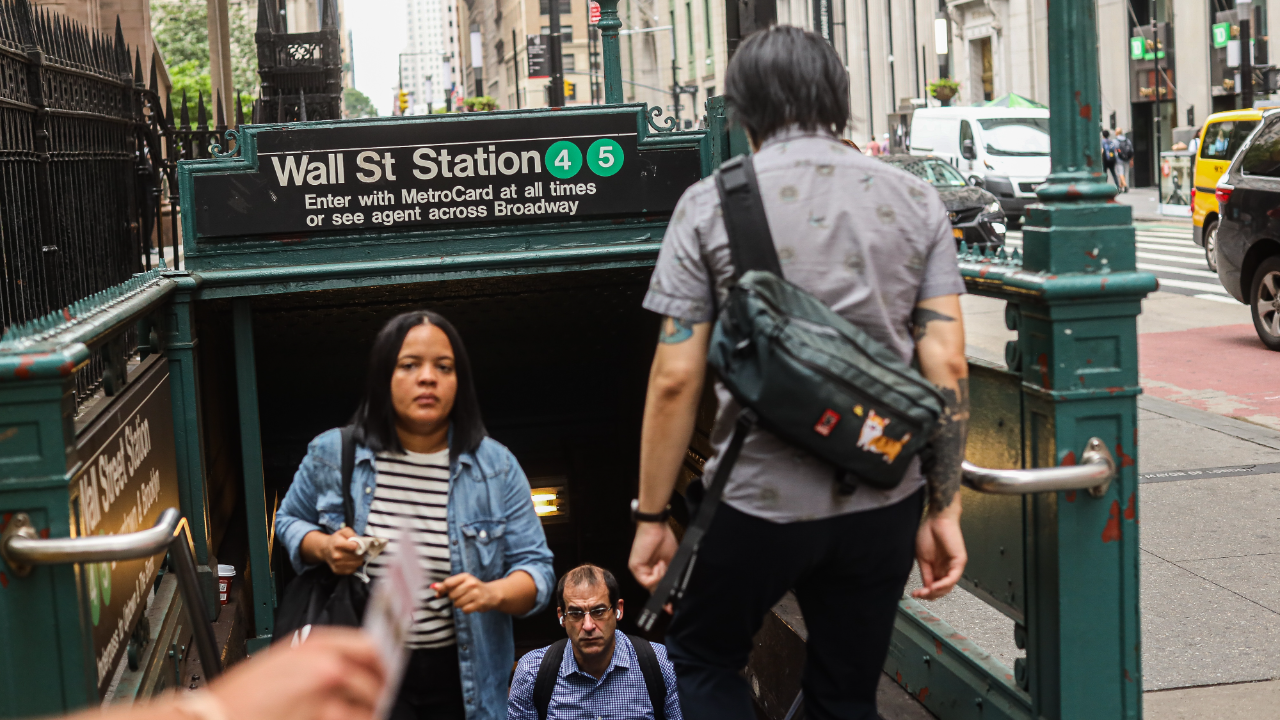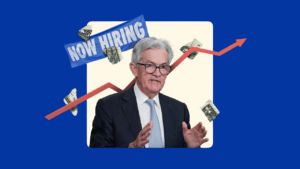Americans have recession fatigue — and it’s keeping them from preparing for the next downturn

When Pasha Grozdov found out his friend’s Manhattan landlord was raising the rent on her one-bedroom apartment from $4,100 to a crushing $6,000 a month, there was only one way he could think to react: with a joke.
“Let’s cancel the economy,” he responded.
Iced coffees in hand, Grozdov and his friend were on an early morning stroll through Central Park. They had just finished taking a 6 a.m. SoulCycle class when she opened up to him about how much the hottest rental market in decades was costing her, a side effect of the devastating coronavirus pandemic.
He’d later convert conversations like these into a series of TikToks detailing how Generation Z feels about the possibility of living through another recession. The videos clearly resonated, capturing a combined six million impressions, 600,000 likes, 3,400 comments and another 37,000 shares as of mid-September. “Another Great Depression? Try me, I’m already depressed,” he joked in one of his most popular videos.
They’re all jokes, but he isn’t kidding.
“I feel a little frustrated and sad about everything,” says Grozdov, 25, also a resident of New York City. “First, the pandemic — we were so young, so full of life and the world was our oyster. And then now what, an economic recession? We’ve already lost two years from 2020. We are not here for this.”
Nearly a third of Americans who aren’t ready for a recession say they’re not doing anything to prepare
Experts are calling it “recession fatigue,” and it might be why nearly a third of Americans who say they’re not prepared for a recession (31 percent) aren’t taking any steps to get their finances ready for one, a Bankrate poll from August found. Even worse, that number jumps to 42 percent for the Americans who say they’re not at all prepared for a recession.
But it’s especially afflicting younger generations, Bankrate’s poll found. Two in 5 Gen Zers (40 percent of those between the ages of 18 and 25) who say they aren’t prepared for a recession aren’t taking any steps to get their finances in order. That compares with 31 percent of unprepared millennials (ages 26-41), 30 percent of Gen X (ages 42-57) and 27 percent of baby boomers (ages 58-76).
“From the Great Recession that may have caused financial stress for their parents to the chaos in health, safety and stability that occurred with the pandemic, these formative events have fundamentally impacted the way Gen Z views the world,” says Megan Gerhardt, professor of leadership and management at the Farmer School of Business at Miami University who specializes in studying generational differences.
People are growing used to catastrophic recessions, making it harder for them to know how to prepare
A Bankrate economists’ poll put the odds of a recession between now and the end of 2023 at 52 percent, nearly a toss up. If it happens, only 44 months at most could separate the next recession from the end of the coronavirus-induced downturn in April 2020. Not since the early 1980s would two downturns have occurred back-to-back in such a short span, according to the National Bureau of Economic Research’s Business Cycle Dating Committee, which tracks and dates recessions. Only a year stood between the first and second recession of the 1980s.
Older generations have certainly lived through more total downturns, considering 12 recessions have occurred between now and 1945, when the first baby boomers were born. But by pure economic data, the two most recent recessions — the Great Recession from December 2007 until June 2009 and the coronavirus crisis from February 2020 through April 2020 — were exceptionally severe, no doubt also contributing to the fatigue.
“Motivation is very difficult to sustain,” says Mariel Beasley, co-founder of the Common Cents Lab, a behavioral science financial health lab at Duke University. She compares it to the difficulty of starting a diet and staying on it for longer than a month. “It just feels like it’s been going on forever, and it’s hard to sustain the long-term chronic stress that a long recession or the pandemic caused. People look for ways to alleviate that, and a lot of it is through consumption.”
Lockdowns and stay-at-home orders to control the virus’ spread are also central to the story. Consumers felt deprived of meals out, vacations and time spent in the company of others during the outbreak.
“Opportunities to spend came back, travel came back, eating out came back,” Beasley adds. “There’s some element of licensing to it. I did a great job not doing this for the last year and a half, and I can go ahead and treat myself.”
A World Health Organization brief from March 2022 also found the global prevalence of anxiety and depression increased by 25 percent during the first year of the pandemic.
Those are all reasons why Grozdov considers learning to appreciate life more and doing things that make him happy an important recession-preparation step itself. He’s still going to visit Starbucks for iced coffees and is also planning a vacation in Europe with his partner soon.
You don’t know if another Great Depression is about to hit, or another pandemic, or war even, and the best way to prepare for a bad time is to have a good time now, today, and to live your life to the fullest. I mean, isn’t that what life is all about anyway?
— Pasha Grozdov, 25, New York City resident
Americans — especially Gen Z — don’t want to lose more progress
The pandemic also gave Grozdov’s generation a taste of what life can be like with a level playing field, and Gen Z wants to see that happen more often, he says. He goes back to his friend’s surging rent and how it differs from what happened during the height of the pandemic. Vacancies hit a 14-year high in June 2020, while listing inventories reached record levels a month earlier, according to an analysis from Douglas Elliman.
But even beyond the rental market, workers coming out of the coronavirus pandemic had more bargaining power than ever. Job openings in February 2021 hit record levels and have stayed there ever since. Employers have two vacant positions for every unemployed worker.
Eager to fill open positions, businesses lifted wages by the most in decades, and it gave workers the wherewithal to negotiate for what they wanted in a job. More than half of adults in the job market were planning to look for a new job, according to a Bankrate survey from March, and they indicated they were on the hunt for workplace flexibility and higher pay.
Those views persisted even as the consequences — 40-year high inflation and an overheating economy — became clear.
“I view the reality that they don’t want to forgo small indulgences as yes, reaction to pandemic — you only live once, might as well enjoy yourself while you can — but also a sign of this renewed need for balance,” Gerhardt says, “Life isn’t all about work and sacrifice, so buy the latte, but make sure you’re putting aside money for retirement. Freedom seems to be a key important value to this generation, but we have to understand how they define it: Freedom to make their own choices.”
The next recession could be the most unusual one yet, making it harder to prepare
But beyond Gen Z specifically, people might not be preparing for the next recession simply because they don’t know how. Many Americans haven’t ever lived through inflation like this, let alone seen it exacerbated by such a perfect storm of events: supply shocks, lockdowns abroad, labor shortages and a war in Ukraine.
Economists say high inflation is going to make the Federal Reserve and Congress less willing to come to the rescue with easy-money policies, a feature of the previous two downturns. Not to mention, the convergence of economic data as the financial system contracts yet employers add hundreds of thousands of jobs each month is adding to the confusion. High unemployment and increased joblessness, an environment often called stagflation, is also rare and counterintuitive.
No one, not even the experts, know for sure what is going on — or what the next downturn could be like. Experts generally say the next recession is unlikely to be as severe as the 2008 financial crisis, but a global slowdown and higher inflation for longer could make it worse.
“The convergence of events since the beginning of the pandemic has been unlike anything we’ve experienced before,” says Mark Hamrick, Bankrate senior economic analyst. “The challenges have been multifaceted, dramatic and complicated. When some are confounded by the tendency of the economy to surprise us during this period, we must remind ourselves of its unprecedented nature, which lends to uncertainty.”
7 unique ways of preparing for an unusual recession when you have recession fatigue
Making sure your finances are on stable footing long before a recession begins is an important step. Being unprepared for any financial disruption like job loss puts you at risk of taking much longer than the economy to recover. And if you’re carrying major financial burdens such as high-cost credit card debt beyond a downturn and into an expansion, you might feel forced into living scarcely, even when you find employment again.
Still, preparing for a downturn when you have recession fatigue isn’t easy — especially when that downturn might be unlike anything you’ve ever experienced before.
Here’s some advice on how to handle a recession, all while making sure you’re not totally depriving yourself of the activities that bring you joy.
1. Start small with your saving, but think twice about big-ticket purchases
Preparing for an unusual downturn with recession fatigue comes down to striking a balance. Take a look at your finances, find out where you’re spending your money and see if you can put just a few dollars a week back into your savings account, as every little bit can help your finances.
But it’s also important to be realistic: A $5 coffee here or there is unlikely to make or break you in a downturn. It’s the bigger-ticket purchases when you’re not sure you can afford them — such as buying designer clothing or purchasing expensive furniture — that can be the most damaging to your financial situation.
2. Build up a fun fund just as much as an emergency fund
Yet, it doesn’t matter what you buy if you know how much you can afford to spend. That’s why a “fun” fund for a recession might be just as important as an emergency fund.
Even if it might not seem related, recessions or the fear of one can be isolating for your social life, especially if you’re cutting yourself off from activities that involve spending money.
Having a fund of cash you know you can spend can help you pick and choose what most excites you, so you feel as if you’re not totally depriving yourself.
3. Remember that buying things can’t solve the problem, so limit impulse buying
Consumers, however, are known to change their buying habits when they’re upset, Beasley says. But often, it’s not sustainable, and doesn’t provide the kind of long-lasting help people need.
“We think, ‘If we buy this, it’ll make us feel different,’ but people return to their base levels after a short period of time,” she says. “It’s tough because it means we end up spending more than we probably ought to in ways to cope with stress and fatigue.”
That might mean taking the impulsivity out of any purchase, especially big-ticket ones, and carefully thinking through what it is you’re buying and whether it’s important to you.
4. Use the job market to your advantage, but still work on building up skills
However unusual it is, the job market is still strong — even though the economy is slowing. You should still consider using it as an opportunity to hunt for a better-paying position or seek a raise or promotion within your company, Hamrick says.
Job-switchers tend to reap the biggest pay gains, according to the Atlanta Fed’s Wage Growth tracker. But even within your company, consider expanding your skill sets or seeking out new job responsibilities to secure higher pay.
“One must consider the true value they are bringing to their position and whether it is reasonable to try to narrow the would-be gap between that value and their compensation,” Hamrick says. “Just wanting a pay raise isn’t good enough.”
5. Don’t change your investing approach — or stop investing altogether
One of the signals flashing red: The stock market. The S&P 500 is down 20 percent to start the year, as investors grapple with higher inflation, higher interest rates and more recession risks, even with the job market still booming. But another way of looking at it, stocks are heavily discounted compared to last year, when they were at record highs.
“The worst time to invest is when people see no risk in the market,” says Gary Zimmerman, CEO and founder of MaxMyInterest. “The best time to invest is when people only see risk in the market.”
The average S&P 500 return during expansions is nearly 90 percent, according to Steve Bruce, senior investment consultant at Northwestern Mutual. And during the past six recessions, the S&P 500 has posted an average return of 13.7 percent, meaning they don’t always “warrant the dread investors often feel,” he says.
“It’s important to focus on long-term goals instead of getting distracted by the short-term noise in the stock market,” Bruce says. “The fact is, wealth isn’t generated only when times are good but also by the decisions you make when the markets are under pressure.”
6. Pursue a side hustle and find extra income streams
Technology presents a unique opportunity for consumers, especially for finding side hustles or building up extra income streams. It’s also something that might not have been available during the Great Recession more than a decade ago.
Making extra cash doesn’t always mean taking on a second job; sometimes, you can make money by monetizing the hobbies and the interests you’re already doing. A Bankrate poll from June found 41 percent of adults will have a side job in 2022, predominantly to earn more income to cover their living expenses.
7. Change your personal finance mindset
Changing the way you think about money might help improve your relationship with it overall. Instead of considering personal finance the act of focusing on what you should not buy, think of it as the practice of making sure your money is working for you and your goals.
Make a note of your goals — whether that’s buying a house or retiring early — and line them up with your individual spending habits. At the end of the day, personal finance is all about making sure your money is working for you.
“You might not want to think about the future for anything because that seems a little too scary, but if you don’t think about the future with your finances or work goals or academic goals, you’re not going to get there,” says Dr. Anisha Patel-Dunn, psychiatrist and chief medical officer at LifeStance Health who’s seen an influx of patients coming in for what she’s describing as “recession depression.” “Take more of a look at what is the meaning of my life and what brings me happiness and what can I focus on in the here and now to bring me happiness.”
Why we ask for feedback Your feedback helps us improve our content and services. It takes less than a minute to complete.
Your responses are anonymous and will only be used for improving our website.






